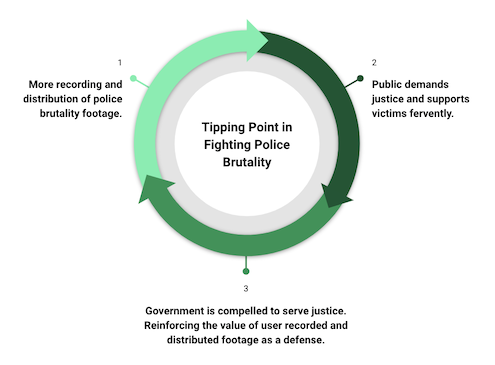Tipping Point in Fighting Police Brutality
Network effect products are driven by their product or service gaining additional value from each and every incremental user. As a result, the more people that use it, the better the solution becomes.
For network effects to begin, there is typically a “tipping point” of necessary users and engagement. Getting there is difficult. It depends on brave, desperate early adopters who seek out the solution, and give it a try when the product or service is still immature. Ultimately though, these early users accumulate to drive the product to a tipping point where it becomes valuable for the majority of customers.
Thanks to early adopters, we’ve been able to see each of these companies push past the tipping point and deliver a significantly better solution, which has led to widespread adoption:
Google tipping point = User searches Google and consistently finds what they’re looking for.
Airbnb tipping point = User searches Airbnb and consistently finds a home that is available and that fits their needs, and trusts Airbnb as a safe intermediary.
Uber tipping point = User requests a ride and consistently waits only a few minutes, and trusts Uber as a safe intermediary.
Though the economic value these companies have created is tremendous, tipping points in social issues are immeasurably more important. Yet, their “tipping points” actually happen in a similar way.
For several years – as emphasized in my earlier post “Technology’s Role in Uncovering Racism – early users of smartphones and social media may have captured police brutality with their smartphone, but decided not to share it because its value was unknown. They may have even decided to post it on social media, but even then, whether or not it would lead to any type of justice was unknown. These early users who did record and distribute footage laid the foundation for today’s tipping point. They were the brave early adopters.
Today, the value is known.
Footage of the tragic deaths of Eric Garner, Ahmaud Arbery, George Floyd, and several others has shown that footage is going viral, and justice is being sought.
A flywheel illustrates the tipping point in fighting police brutality thanks to smartphones and social media:

Social media has become a valuable and trusted recourse in the face of police brutality. Thanks to those early users who leveraged smartphones and social media before them, the flywheel towards driving police accountability is starting to kick in.
Americans are more likely to document police interactions because they see the increasing value and credibility of user generated content as a measure of self-defense. Thankfully for us all, tipping points are very difficult to reverse once they start – and this one will truly serve as a public good for all.